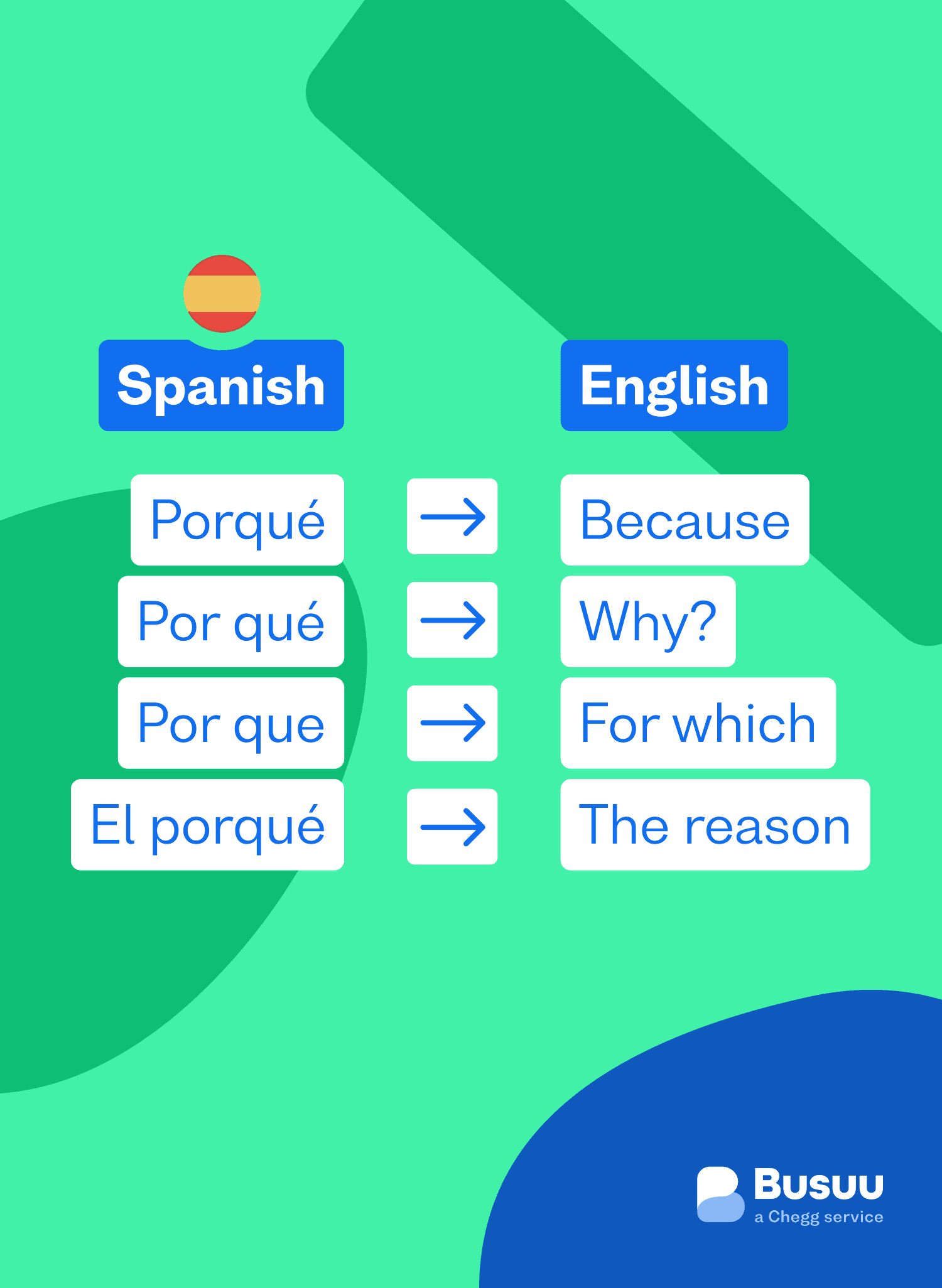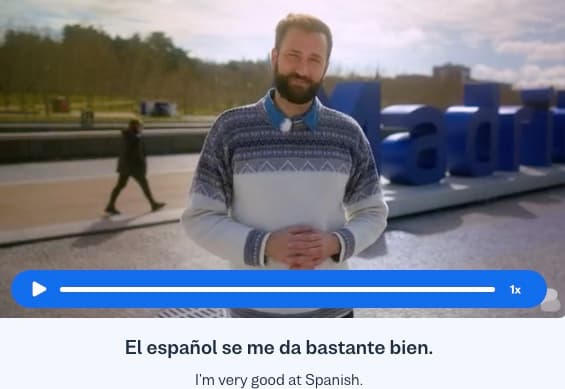I want to learn...
Author:

Grayson Steinberg
“Tell me whyyyyyy!” The Backstreet Boys asked this indirect question in their 1999 pop hit “I Want it That Way!” In life, the question “why” is definitely fundamental. Everyday our friends, partners, classmates and co-workers ask us to give reasons why we do what we do or to justify our points of view and this is equally true in both English and Spanish.
You might already know that Spanish speakers use two similar words in these situations: porque and por qué. You might also be scratching your head wondering what the difference is.
It’s totally normal to mix up these two words when you’re first embarking on your Spanish-learning journey. In this article, we’ll break down how to differentiate porque and por qué and use both words in simple conversations or short text messages with confidence.
Who knows? Someday, you might have the chance to explain por qué you’re still a big fan of the Backstreet Boys!
What does porque mean?
Porque is the Spanish word for “because.” We use it when we want to provide additional context or information, or to give reasons for our ideas and opinions. Porque is always written as one word and we pronounce it “poor-kay”, with the second syllable having a similar sound to the long “a” vowel sound in English (as in bay, okay say)

When to use porque
We use porque in statements like the ones listed below to give you a better idea:
1. To describe the qualities of something when talking about likes and dislikes in general:
Me gusta el queso porque es muy sabroso. (I like cheese because it’s delicious!)
¡No me gustan los Backstreet Boys porque sus canciones son horribles. (I don’t like the Backstreet Boys because their songs are horrible!)
Whether you’re explaining your life-long love of the la playa (the beach) or why you don’t particularly like pescado (fish), it’s a good idea to try using the following structure:porque + ser + adjective.
For example:
Me encanta la playa porque es tan relajante. (I love the beach because it’s very relaxing).
Good to know: If you’re feeling a bit rusty about when to use the verb ser, don’t worry! (¡no te preocupes!), this excellent master class on ser will answer all your burning questions.
2. To explain your ideas, thoughts and opinions in a specific situation:
Quiero cortarme el pelo porque está muy largo. (I want to get a haircut because my hair is getting very long.)
No quiero comer pizza porque ya la comimos ayer. (I don’t want to eat pizza because we already ate it yesterday.)
Pro Tip: Constructing sentences in Spanish can be challenging porque there are so many verb tenses, some of which don’t exist in English. If you need a refresher on verb conjugation in Spanish, here’s a great one!
3. To provide reasons or give an excuse for something that happened:
Llegué tarde a clase porque había mucho tráfico. (I arrived late to class because there was a lot of traffic.)
Estoy muy cansado porque me acosté muy tarde. (I’m tired because I went to bed very late.)
Using porque in a sentence is relatively straightforward. It’s a practical word to know for many everyday situations, like explaining why you arrived late or you forgot to call a friend back, why you’re tired or even why you’d rather listen to 1990s boy bands than today’s pop music.
Now let’s move on to its fraternal twin por qué.
So what about por qué?
Por qué means why and in this form, we always break it up into two words. It’s pronounced exactly the same way as its sibling (poor-KAY), but we need to emphasize the second syllable a bit more. That’s because this por qué carries an accent mark at the end.
Another useful tip for remembering when to use por qué is that if writing direct interrogative questions, question words like por qué have a question mark at the start, just like in these examples:
¿Por qué quieres aprender español? (Why do you want to learn Spanish?)
¿Por qué no abres la ventana? Hace mucho calor! (Why don’t you open the window? It’s really hot!)
So what’s the deal with this pair of question marks? Well, the customary inverted question mark at the start of a question is not just decorative; It’s a signpost that helps the reader to understand that someone is asking a question.
Consider the following examples without any punctuation (or accents!):
Por que bebes cafe. (Why do you drink coffee?)
Porque bebes cafe. (Because you drink coffee.)
These two cases highlight the difficulty of understanding someone’s intentions here. It could make the difference between your Peruvian friend’s shock over why you’re downing that third cup of coffee and that same friend insisting that you don’t get enough sleep because of all thecaféyou drink.
The truth is that with informal means of communication like text messages, people often leave out punctuation marks (just like in English!). We can avoid miscommunication by using question marks at the beginning and end of a sentence to help people know what to expect.
Hopefully, you’ll feel a bit more comfortable using por qué to ask why they’re getting another cat (you can never have enough) or why they aren’t going to the barbacoa (barbeque)!
Porque vs. por qué: The exception
Okay, so there’s a slight loophole here. When we say or write a statement where a question is implied (known as an indirect question), we revert to the question word por qué.
What? ¿Por qué?
Imagine the following situations:
Situation 1: Your Argentine flatmate notices what you’re watching on the big-screen TV in the living room and exclaims, “No entiendo por qué ves esa película. ¡Es muy aburrida!” (I don’t understand why you’re watching that film. It’s so boring!)
Situation 2: A friend is upset after finding out that you’re not joining a mutual group of friends for a reunion dinner and says, “No entiendo por qué no vienes a a la cena.” (I don’t understand why you’re aren’t coming to dinner.)
While a question isn’t being asked directly, we can infer it. Let’s try transforming these into direct questions. Do they have the same meaning as before?
¿Por qué ves esa pelicula? (Why are you watching that film?)
¿Por qué no vienes a la cena? (Why aren’t you coming to the dinner)
The answer is definitely yes. If you’re ever in doubt about whether to use por qué in a statement, see if it would be a logical question as well. If it does, you’ll use por qué. If it doesn’t, then you’ll use porque.
Like indirect questions in English, indirect questions in Spanish are treated like statements as far as punctuation is concerned and end in a full stop (that’s British English for the punctuation mark Americans know better as a period).
Good to know: Remember how you used to ask why questions all the time when you were little? Why is the sky blue? Why does ice cream melt? Why is it always hot in summer? Use this method to practice the difference between porque and por qué. Ask your yourself a question that has an easy answer.
¿Por qué estoy cansado? Porque me acosté muy tarde anoche. (Why am I tired? Because I went to bed very late last night.)
Wrapping up
The differences betweenporqueandpor quéare subtle and important. We’ve explored how to useporqueto give reasons (or even excuses!) for doing what you do and thinking what you think. We’ve investigated how to usepor quéto ask everyday questions about people’s ideas and opinions. Now you can go forth and proudly explain to your Spanish-speaking friends the reasonspor quéyou’re still a huge fan of the Backstreet Boys and will always be (porquethey’re the greatest boy band ever!)
AUTHOR

Grayson Steinberg
Newlanguages


